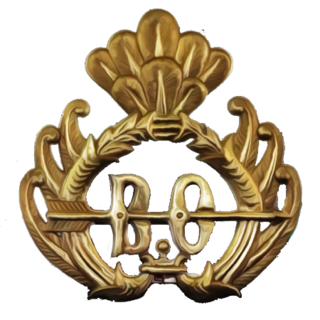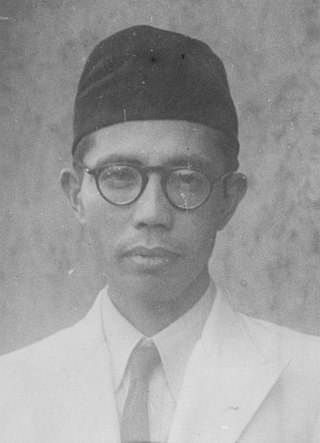
Budi Utomo was an early native nationalist political society in the Dutch East Indies. The organization's founding in 1908 is considered instrumental to the beginning of the Indonesian National Awakening.

Gerungan Saul Samuel Jacob Ratulangi, known as Sam Ratulangi, was a Minahasan teacher, journalist, politician, and national hero from North Sulawesi, Indonesia. He was part of the committee that ratified the Constitution of Indonesia and served as the first Governor of Sulawesi.

Sarekat Islam or Syarikat Islam was an Indonesian socio-political organization founded at the beginning of the 20th century during the Dutch colonial era. Initially, SI served as a cooperative of Muslim Javanese batik traders to compete with the Chinese-Indonesian big traders. From there, SI rapidly evolved into a nationalist political organization that demanded self-governance against the Dutch colonial regime and gained wide popular support. SI was especially active during the 1910s and the early 1920s. By 1916, it claimed 80 branches with a total membership of around 350,000.

Oemar Said Tjokroaminoto, better known in Indonesia as H.O.S. Tjokroaminoto, was an Indonesian nationalist. He became one of the leaders of the Islamic Trade Union, founded by Samanhudi, which became Sarekat Islam, which they both cofounded.

The Council of Indonesian Muslim Associations Party, better known as the Masyumi Party, was a major Islamic political party in Indonesia during the Liberal Democracy Era in Indonesia. It was banned in 1960 by President Sukarno for supporting the PRRI rebellion.

Soekiman Wirjosandjojo was an Indonesian politician and physician who served as prime minister of Indonesia from 1951 until 1952. Additionally, Soekiman served as the first president of the Masyumi Party from 1945 to 1951.

Indonesian Islamic Union Party was an Islamic political party in Indonesia before and after independence. In 1973 it was merged into the United Development Party.
The Association of Political Organisations of the Indonesian People was a federation of pre-war Indonesian political parties that was established to unite a range of organisations in the struggle for Indonesian independence.

The Soetardjo Petition was a motion of the Volksraad of the Dutch East Indies, instigated by the member Soetardjo Kartohadikusumo, which was submitted as a petition to Queen Wilhelmina and the Estates General of the Netherlands asking for more autonomy.

The Indonesian Political Federation was an umbrella organization of various nationalist organizations in the Dutch East Indies which existed from 1939 to 1942. Founded to unite the nationalist movement, GAPI championed the creation of an Indonesian parliament in exchange for cooperation with the Dutch colonial government. The federation consisted of eight political parties. GAPI was dissolved shortly after the invasion of the colony by the Empire of Japan in 1942.

The Volksraad was an advisory, and later semi-legislative institution for the Dutch East Indies, provided for by law in 1916 but only established with the actual installation of the Council in 1918. It was a hesitant and slow attempt at democratisation of the Dutch East Indies as part of the "ethical policy" adopted by the Dutch government. The power of the Volksraad was limited as it only had advisory powers. Although part of the council was elected, only a small proportion of the population had voting rights.

Parindra was the name used by two Indonesian political parties.

Arudji Kartawinata was an Indonesian politician and military officer. During the Indonesian National Revolution, he was the first commander of the 3rd Division, predecessor to the modern Siliwangi Division. Politically, he was initially a member of Masyumi before later re-forming the Indonesian Islamic Union Party. He served as the chairman of the People's Representative Council for three years between 1963 and 1966.

Jong Batak Bond, sometimes simply called Jong Batak, was a short-lived but influential Batak intellectual organization founded in Batavia, Dutch East Indies in December 1925. Like Budi Utomo, Jong Java and other such organizations, its members consisted of native Indonesian students in Dutch-language schools interested in advancing their ethnic group and Indonesian nationalism at the same time. Notable members of the group include Amir Sjarifuddin Harahap, Todung Sutan Gunung Mulia Harahap, Sanusi Pane, Saleh Said Harahap and Arifin Harahap.

Jusuf Wibisono was an Indonesian politician and economist. A member of the Masyumi Party, he served as Minister of Finance from 1951 until 1952 and again from 1956 until 1957, under the Soekiman and Second Ali Sastroamidjojo cabinets. Originating from Magelang, Wibisono took part in Islamic organizations in the nationalist movement from his school years. He joined Masyumi during the Indonesian National Revolution, and became a leading member within the party despite disagreements with other party leaders such as Mohammad Natsir. In both of his tenures as finance minister, he relaxed the tight budgetary controls of his predecessor, and provided favors to political parties.
The Indonesian People's Movement, better known as Gerindo, was a left-wing and nationalist political party in the Dutch East Indies which existed from 1937 to 1942. It had modest goals and was largely cooperative to the colonial administration. More strongly anti-fascist than anti-colonialist, the party sought to support the colonial government in opposing fascism, especially Japanese fascism.

Prawoto Mangkusasmito was an Indonesian politician who served as the final chairman of the Masyumi political party before its dissolution in 1960. He also served as the Deputy Prime Minister of Indonesia during the Wilopo Cabinet between 1952 and 1953.
Abdul Rasjid Siregar gelar Mangaradja Mahkota Soeangkoepon, commonly known as Dr. Abdul Rasjid, was a politician and physician in the Dutch East Indies. He was elected or appointed to the Volksraad from 1931 to 1942, during which time he sat with the Indonesian nationalist faction. During the 1930s, he became convinced that public health and cooperation with traditional healers should be central to the mission of physicians in the Indies.

Raden Wiwoho Purbohadidjojo was an Indonesian nationalist from Temanggung and one of the founders of Jong Islamieten Bond. He served as the minister of information in the Halim Cabinet and the ambassador of Indonesia to Belgium from 1956 to 1959.
















